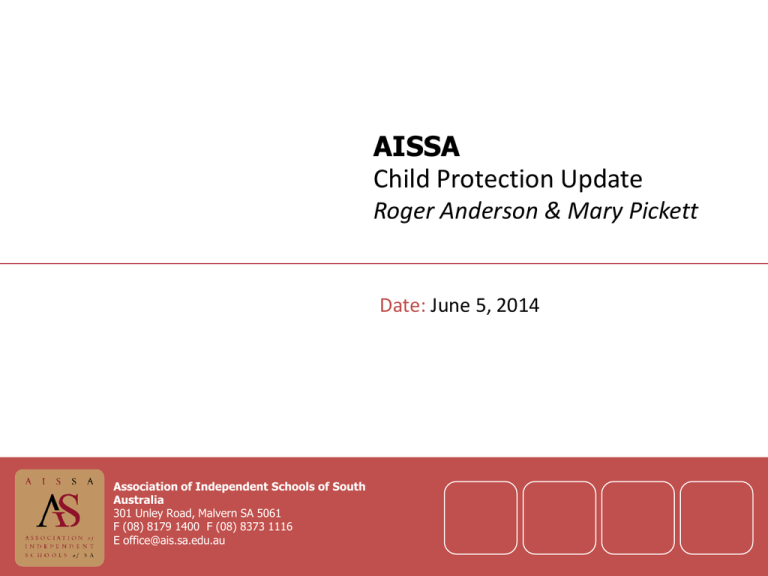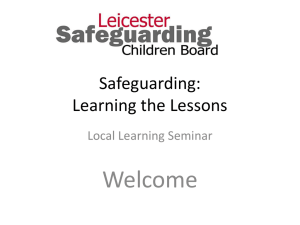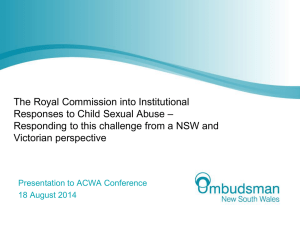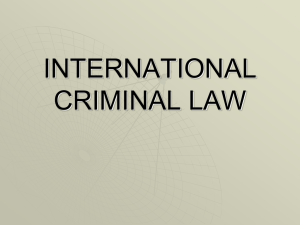
AISSA
Child Protection Update
Roger Anderson & Mary Pickett
Date: June 5, 2014
Association of Independent Schools of South
Australia
301 Unley Road, Malvern SA 5061
F (08) 8179 1400 F (08) 8373 1116
E office@ais.sa.edu.au
Welcome and Introductions
• Roger Anderson
• Mary Pickett
• Sonia Albertini
Association of Independent Schools of SA
Child Safe Organisations
Legislation
Values,
Behaviours,
& Culture
Policy,
Procedures &
Code of
Conduct
Child Protection Update
1. The context
•
Legal Obligations
•
Community Expectations
2. Ensuring a Child Safe School – prevention and
going beyond compliance
3. Managing allegations and incidents
4. Support for Schools
5. Questions
Association of Independent Schools of SA
Legal obligations
• Children’s Protection Act
• School Registration
• Enrolment contracts
• Duty of care
Association of Independent Schools of SA
The Context
School registration requirement:
“the school provides adequate protection for the
safety, health and welfare of its students”
Association of Independent Schools of SA
Legal Obligations
Children’s Protection Act 1993
Schools are required to:
• develop policies and procedures to establish and
maintain child safe environments
• conduct criminal history assessments for employees,
contractors and volunteers in prescribed positions who
are working with children (unless an exemption applies)
• lodge a Child Safe Environment Compliance Statement
with the Department for Education and Child
Development (DECD)
Association of Independent Schools of SA
Update: Legal Obligations
Policies and procedures must comply with Standards and
Principles issued from time to time by the Chief Executive,
DECD. In particular:
Child Safe Environments: Principles of Good Practice
http://www.ais.sa.edu.au/__files/f/1853/Child%20Safe%20Environments%20Principles%20of%
20Good%20Practice%20-%20July%202012.pdf
Child Safe Environments: Standards for dealing with
information obtained about the criminal history of employees
and volunteers who work with children
http://www.ais.sa.edu.au/__files/f/185453/Child%20Safe%20Environments%20%20Standards%20for%20dealing%20with%20criminal%20history%20of%20employees%20and
%20volunteers%20-%20July%202012.pdf
Association of Independent Schools of SA
Child Safe Environments: Principles of Good Practice
Principle 1: Identify and analyse risk of harm
Principle 2: Develop a clear and accessible child safe policy
Principle 3: Develop codes of conduct for adults and children
Principle 4: Choose suitable employees and volunteers
Principle 5: Support, train, supervise and enhance performance
Principle 6: Empower and promote the participation of children in
decision-making and service development
Principle 7: Report and respond appropriately to suspected abuse and
neglect
Association of Independent Schools of SA
Criminal History Assessment
Criminal history assessment required before appointment and at least
every three years for a person who has:
• regular contact with children or working in close proximity to children
on a regular basis, unless the contact or work is directly supervised at
all times; or
• supervises or manages persons in positions requiring or involving
regular contact with children or working in close proximity to children
on a regular basis; or
• accesses records relating to children.
Association of Independent Schools of SA
Standards: Criminal History Information
Standards for dealing with information obtained about the criminal history of
employees and volunteers who work with children
Standard 1: Identifying prescribed functions and prescribed positions
Standard 2: Developing understandable and accessible procedures to
obtain criminal history reports
Standard 3: Conducting criminal history assessments in a timely and
regular manner
Standard 4: Accepting other evidence
Standard 5: Assessing criminal history reports
Standard 6: Ensuring procedural fairness throughout the assessment and
decision-making processes
Standard 7: Ensuring good practices when dealing with criminal history
information
Association of Independent Schools of SA
Criminal History Assessment: Exemptions
• Registered teachers
• Police officers
• A person who undertakes work on a voluntary basis to provide a
service in his or her capacity as a parent or guardian of a child who is
ordinarily provided with the service;
• A person who undertakes work on a voluntary basis to provide a
service and who is under 18 years of age;
• A person who undertakes work in the course of, or for the purposes
of, an event or activity that takes place over a period of not more than
10 consecutive days or not more than 1 day in any month;
Association of Independent Schools of SA
Legal Obligations
Criminal Screening
•
Teachers
•
non-teachers
•
student teachers
•
volunteers
•
billeting families
•
DCSI, National Police Certificate, CrimTrac
•
Notification of incidents
•
Exchange of Information
Association of Independent Schools of SA
http://www.decd.sa.gov.au/docs/documents
/1/InformationSharingGuideli.pdf
http://www.ais.sa.edu.au/__files/f/78632/Infor
mation%20Sharing%20Guidelines%20Appendix
%20FINAL.pdf
Community Expectations
• Child focus
• Not just school related matters
• Debelle
• Inter-sector Guidelines
• Advise AISSA
Association of Independent Schools of SA
Child Safe Organisations
Legislation
Values,
Behaviours,
& Culture
Policy,
Procedures &
Code of
Conduct
Beyond Compliance
- a moral obligation
Child safe organisations take a proactive and preventative
stance on child protection issues and foster a child safe
environment as the main consideration in all its activities and
management practices. Child protection is embedded in the
organisation’s culture and is understood at all levels of the
organisation.
A Child-Focused Community: Keeps actions relevant to the
child’s needs not the needs of others.
Association of Independent Schools of SA
Prevention: being proactive
The best ‘response’ to adult sexual misconduct in education and care
settings is to prevent it occurring in the first place.
The best way to limit adults’ opportunity to harm children and young
people is to establish an environment where it is extremely hard for any
inappropriate adult behaviours to go unnoticed and unchecked.
The leader’s role
1. Establishing a safe-aware environment where everyone will recognise
inappropriate behaviour and speak up about their concerns, and
2. Taking the right action when those concerns are raised with you
Association of Independent Schools of SA
Beyond Compliance: a proactive approach
Nature of offenders:
•
Criminal intent
•
Opportunity and situational based child offending
Clear articulation to school community and beyond of your:
•
Child Protection Policy
•
Code of Conduct and Professional Boundaries
•
Consequences for breaches
Website, recruitment documentation, etc..
Association of Independent Schools of SA
Beyond Compliance: a proactive approach
Physical Environment: all sites
People: all employees, volunteers, visitors, contractors, students, parents
Culture:
•
Values, beliefs, perceptions and attitudes
•
Relationships and interactions
Awareness and action
•
Identify risks and vulnerable children
•
Recognise inappropriate behaviour
•
Speak up about concerns
•
Taking the right action when these concerns are raised
Beyond Compliance: The RIGHT People
Choosing and developing the right people:
The right people working in your organisation contribute to creating a
positive, child safe environment. Whether you are choosing staff or
volunteers, or supporting existing staff or volunteers, developing the right
team is an important and ongoing process.
Recruit: To attract the right people include a statement about your
commitment to being a child safe environment in your recruitment
materials and on your school website.
Assess: Inquire about the applicant’s motivation to work with children,
their competency and their values; verify their past experience; follow up
their references – more than a criminal history check.
Training: Child-Safe Environments
All teaching and non-teaching staff: compulsory
Responding to Abuse & Neglect (RAN)Training
•
7 Hour Module then online update 3 yearly
•
2015 update year: keep everyone up to date and on the same
page by doing 2015 training in the same term it is released
Tertiary Students (responsibility of the university)
Promoting Safety and Wellbeing: Induction for tertiary students
working with children and young people in education and care sites
Association of Independent Schools of SA
Training: Child-Safe Environments
Volunteers: Responding to Abuse and Neglect
Education and Care Induction for Volunteers
• Online Module (20 minutes)
• In-school
o PowerPoint presentation, handbook and certificate
http://www.ais.sa.edu.au/about-aissa/policy-advice#41309
Association of Independent Schools of SA
http://dl.dropboxusercontent.com/u/62498018/Volunteer%20Training/Resp_5/Resp_5.htm
Responding to
abuse and neglect
Education and care induction session
for volunteers
26
‘The more vigilant and
transparent an education or
care community is in
complying with the
Protective Practices
document the more likely it
will be that sexual
misconduct can be
prevented.’
Managing Allegations of Sexual
Misconduct Guideline, p 7.
• Is your Child Protection Policy and
‘Code of Conduct’ understood by
all staff, parents, students and
volunteers?
• Do staff understand the Protective
Practices Guidelines and how they
protect them?
• Are professional boundaries and
how they apply at your school
discussed, made explicit and
scrupulously abided by all staff ?
• Are there regular discussions
around ‘grey areas’?
• Are the consequences of breaches
clearly understood?
• Would early intervention occur to
prevent any boundary crossing
escalating?
Beyond Compliance: Students
Do all your students…
1. Know how to recognise abuse and to tell a trusted adult
about it?
2. Understand what is appropriate and what is
inappropriate? adult to child/child to child?
3. Have the skills and knowledge to keep themselves safe?
4. Have a voice that is listened to, responded to and
respected within the school?
Association of Independent Schools of SA
KS: CPC
Keeping Safe: Child Protection Curriculum (updated 2014)
• Early Years: Ages 3-5
+ Disability & additional needs
• Early Years: Years R-2
+ Culturally & linguistically diverse
• Primary Years: Years 3-5
backgrounds
• Middle Years: Years 6-9
• Senior Years: Years 10-12
4 Focus Areas
1. Right to be safe
2. Relationships
3. Recognising & Reporting Abuse
4. Protective Strategies
Association of Independent Schools of SA
Keeping Safe: Child Protection Curriculum
•
Training for teachers is now run by Principals Australia
1 full day ($100)
•
On-site training is available for schools ($1600)
http://keepingsafe.paivement.com/
•
For teachers who have completed the full day course an online update
(approx. 1 hour) is now available
http://rantraining.e3learning.com.au/
•
Resources available only to those who have completed the full day course and
the update
Association of Independent Schools of SA
Managing
Allegations
and
Incidents
Managing allegations and incidents
• AISSA notified by SAPOL and Families SA
• Not just school incidents
• Debelle recommendations
• Communications – staff, parents, media
• Managing allegations of sexual misconduct
Association of Independent Schools of SA
Managing
Allegations
and
Incidents
Revised 2013
http://www.ais.sa.edu.au/__files/f/172622
/Managing%20allegations%20of%20sexual
%20misconduct%20in%20SA%20education
%20and%20care%20settings.pdf
Responding to problem sexual
behaviour in children and
young people:
Guidelines for staff in
education and care settings.
Revised 2013
http://www.ais.sa.edu.au/__files/f/181
371/Responding%20to%20problem%20
sexual%20behaviour%20in%20children
%20and%20young%20people.pdf
Reporting
• Child Abuse Report Line 13 14 78
• Online www.reportchildabuse.families.sa.gov.au
• Records
• Mandated notifiers: change to defence
• Reporting to Principal
o Counsellors confidentiality
Association of Independent Schools of SA
Lessons Learned
Resources & Support
• AISSA - call or contact by email
• AISSA website
• Handout: support agencies
Association of Independent Schools of SA
Reflection
1. What’s working well at your school?
2. What do you need to audit or rethink?
• Staff understanding of their responsibilities to report concerns
• Provision of the Child Protection Curriculum
• Screening compliance/background checks
• Documenting practice/record keeping
• Staff understanding of professional boundaries and protective
practices; discussions around ‘grey areas’
Association of Independent Schools of SA
Reflection
2. What do you need to audit or rethink?
• Knowledge of the Responding Problem Sexual Behaviours Guidelines
for sexual incidents between children and young people
• Yard duty/Boarding House duties
• One to one work involving mentors, boarding tutors, private
providers, youth workers, coaches.
• Governing council/parent community understanding of professional
boundaries
• Social Media Guidelines
• What else?
Association of Independent Schools of SA
QUESTIONS
Association of Independent Schools of SA
The following slides have been adapted from:
Managing allegations of sexual misconduct ppt
Introduction for site
leaders
What is the right action?
Scenario 1: A parent rings you to say she is grateful for the support
a teacher is providing to her daughter with her Yr12 studies.
However she’s concerned the support is sometimes given by text
message from their personal mobile phone on the weekends.
Scenario 2: A staff member shares a concern with you that a coclass teacher appears to be regularly counselling one of the
students at the end of the day and sometimes at lunchtime, always
in the classroom after other students have left and sometimes with
the classroom door closed.
Association of Independent Schools of SA
What is the right action?
Scenario 3: A parent tells the OSHC director that his son says he
doesn’t like one of the OSHC staff because they ‘hang onto my
waist sometimes when we play touch footy.’
Scenario 4: A child complains to the preschool director that one of
the preschool staff stays in the toilet even though she doesn’t want
any help.
Association of Independent Schools of SA
In all cases…
•
The matter must be raised with the adult concerned
•
The direction and expectation about future behaviour must be made explicit:
•
•
Engage in play with students that does not involve inappropriate touch
•
Follow the centre’s toilet policy
•
Only use site approved IT systems for student support
•
Refer children with counselling needs to appropriate personnel
•
Do not spend time with students alone
The direction/expectation must be recorded, signed and dated by both the
adult and the leader and stored in a confidential file with a copy provided to
the adult
Association of Independent Schools of SA
In all cases…
•
If the concern is found to be unjustified it is very important this is still
recorded, signed, dated and a copy provided to the adult.
•
The parents and, where appropriate, the child or young adult must be
informed of how the matter has been responded to and this action must be
outlined on the same record. If it is considered unsafe to speak with parents
the reason for this must be included on a record of concern document
Association of Independent Schools of SA
In some cases…
•
Following up on a concern – looking at communication between an adult and
a student, speaking with the adult concerned, other staff, parents or students
– might reveal further information that raises the original concern to a more
serious level, or
•
This may be the second occasion on which you have had concerns raised with
you about an adult’s conduct and you may have already given clear direction
to them regarding conduct expectations of the same or similar nature.
In cases where you are unsure about the seriousness of the matter, it would be
advisable to discuss the facts confidentially (leadership team members, AISSA or
seeking legal advice) before determining your next steps.
Association of Independent Schools of SA
The challenges of addressing concerns
What if …
•
the adult has made an innocent mistake?
•
the concern is found to be unjustified?
•
the adult is angry/devastated/offended that the matter has been raised?
•
the adult refuses to sign the report?
•
my working relationship with the adult is compromised?
•
the child/young person or parent isn’t happy with my action?
Association of Independent Schools of SA
Having these conversations protects…
•
Children and young people
•
Adults who have not understood appropriate boundaries and have no intent
to harm children and young people
•
The parent community’s confidence in the school
•
The school’s compliance with policies such as Protective Practices
•
The leader’s integrity and authority
They also deter adults from exploiting their positions in working or volunteering
with children and young adults
Association of Independent Schools of SA
Establishing an ‘aware’ community
Each of the four scenarios involved a concern that was raised with the leader
because either a
•
parent
•
student or
•
other adult
knew what to speak up about and felt ‘safe’ to do so.
Of these three groups at your school – which are you most and least confident
about in terms of their knowledge and comfort to speak up?
Association of Independent Schools of SA
Incidents of extreme seriousness
•
Death of a child/young person
•
Attempted or completed suicide on site
•
Serious physical harm of a child/young person (assault or accident)
•
Serious incident involving a child/young person under the Guardianship of the Minister
•
Serious allegations of sexual abuse between children and young people occurring at the
site or when a duty of care applies (e.g. camp or excursion)
•
Serious threats to safety of site (e.g. fire, serious infectious disease, weapons or firearms)
•
Allegation of child sex related crime against an employee/volunteer/service provider
•
Serious neglect of duty of care by employee (e.g. child lost on excursion)
•
Serious criminal charges against an employee/volunteer
Association of Independent Schools of SA
Incidents of extreme seriousness
1. A groundsman finds a school-based apprentice masturbating in the student
toilet block. It is after hours and no children are at the school.
2. A Yr5 student tells her class teacher that a volunteer has been kissing her and
feeling her bottom and has said they will hurt her if she tells anyone
3. A male Yr12 student grabs a female Yr8 student’s breasts, picks her up and hugs
her on the oval at lunchtime. The girl reports the matter as she is afraid of the
boy. The boy is suspended.
4. You are advised by a staff member that a contract teacher has a large quantity
of videos of children taken at your school’s swimming carnival on their personal
camera. The contract teacher did not have responsibility for filming the day and
they did not seek your permission to film. Their contract has concluded and
they no longer work at your site.
Association of Independent Schools of SA
Talking through the checklist p.20
The site leader’s starting point depends on how the allegation has been raised:
• Either with you, by someone at your site or in your community’
or
• You are advised by the police
Key responsibilities
• Support for the child/young person and their family (Appendix 6)
• Record keeping (Appendices 1 and 2)
• Communication with others – advice to staff, letters to your parent
community, meetings with individual parents, groups of parents, governing
council members
Association of Independent Schools of SA
Reminders
1. Always seek advice if unsure about the seriousness of any matter raised with
you
2. Your responsibility to act in response to allegations applies:
•
to any adult connected to the site
•
whether the connection to the site is current or the adult has resigned, is
on leave or is deceased
•
no matter where or when the incident is alleged to have occurred
3. When an allegation relates to electronic material do not delete – quarantine it
for SA Police investigation
4. Document everything as soon as possible in a factual manner using the
templates provided
Association of Independent Schools of SA
Reflection and questions
1. What’s working well at your school?
2. What do you need to audit or rethink?
•
Staff understanding of their responsibilities to report concerns
•
The provision of the Child Protection Curriculum
•
Knowledge of the Responding Problem Sexual Behaviours Guidelines for sexual
incidents between children and young people
•
Screening compliance/background checks
•
Yard duty practice (classroom security during recess and lunch, toilet policies)
•
One to one work involving mentors, private providers, youth workers, home visits
•
Governing council/parent community understanding of professional boundaries
•
Documenting practice
Association of Independent Schools of SA
Association of Independent Schools of SA









